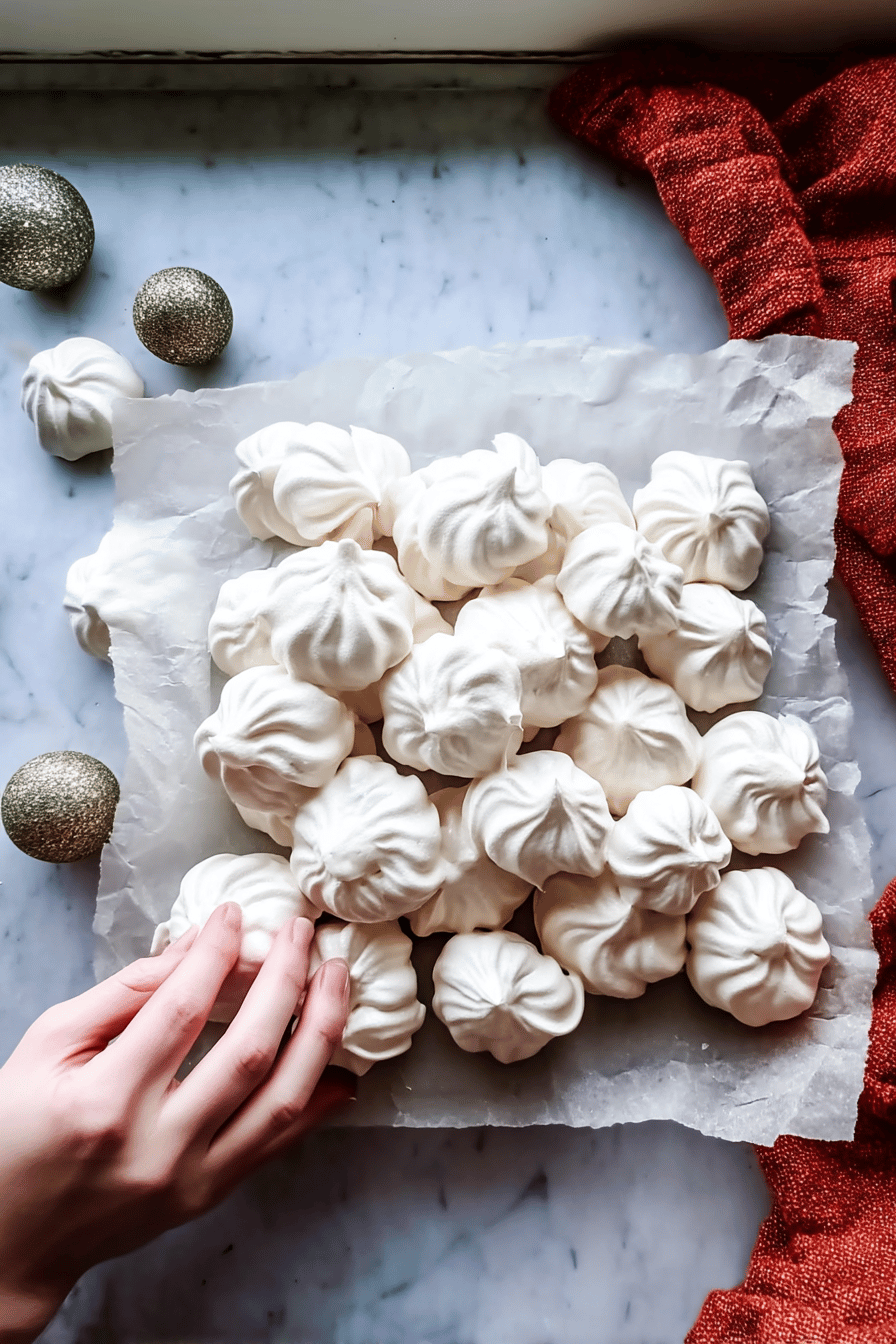Benefits and Advantages of meringue cookies
Meringue cookies offer several benefits that make them an excellent choice for both novice and experienced bakers. Their simplicity in preparation is one of the main advantages, requiring only a few basic ingredients like egg whites and sugar, which makes the recipe very accessible. Additionally, these cookies are naturally low in fat and calories, appealing to health-conscious individuals seeking a sweet treat without the guilt.
Meringue cookies also stand out due to their versatility; they can be flavored or colored easily, and they adapt well to dietary restrictions such as gluten-free and vegan diets when suitable substitutions are made. The light, airy texture distinguishes them from heavier baked goods, making them a delightful, melt-in-the-mouth dessert option. Their long shelf life, when stored correctly, further enhances their appeal. Altogether, these attributes make the meringue cookie recipe highly effective for a wide range of dietary needs and preferences.
Essential Ingredients for meringue cookies
- 4 large egg whites at room temperature
- ½ teaspoon cream of tartar
- ⅛ teaspoon salt
- 1 cup (200 g) granulated sugar
- 1 teaspoon vanilla extract (optional; can substitute with almond, peppermint, lemon, orange, coconut, cherry, or raspberry extracts)
- Optional: gel food coloring for decorative effects
These ingredients combine to produce a smooth, glossy, and stable meringue mixture essential for light and crisp cookies. Cream of tartar helps stabilize the egg whites, enhancing volume and texture. Using granulated sugar, added gradually, ensures full dissolution and a delicate crunch. Flavor extracts and gel coloring provide customization options without compromising the meringue’s structure. Naturally gluten-free, this recipe suits various dietary needs.
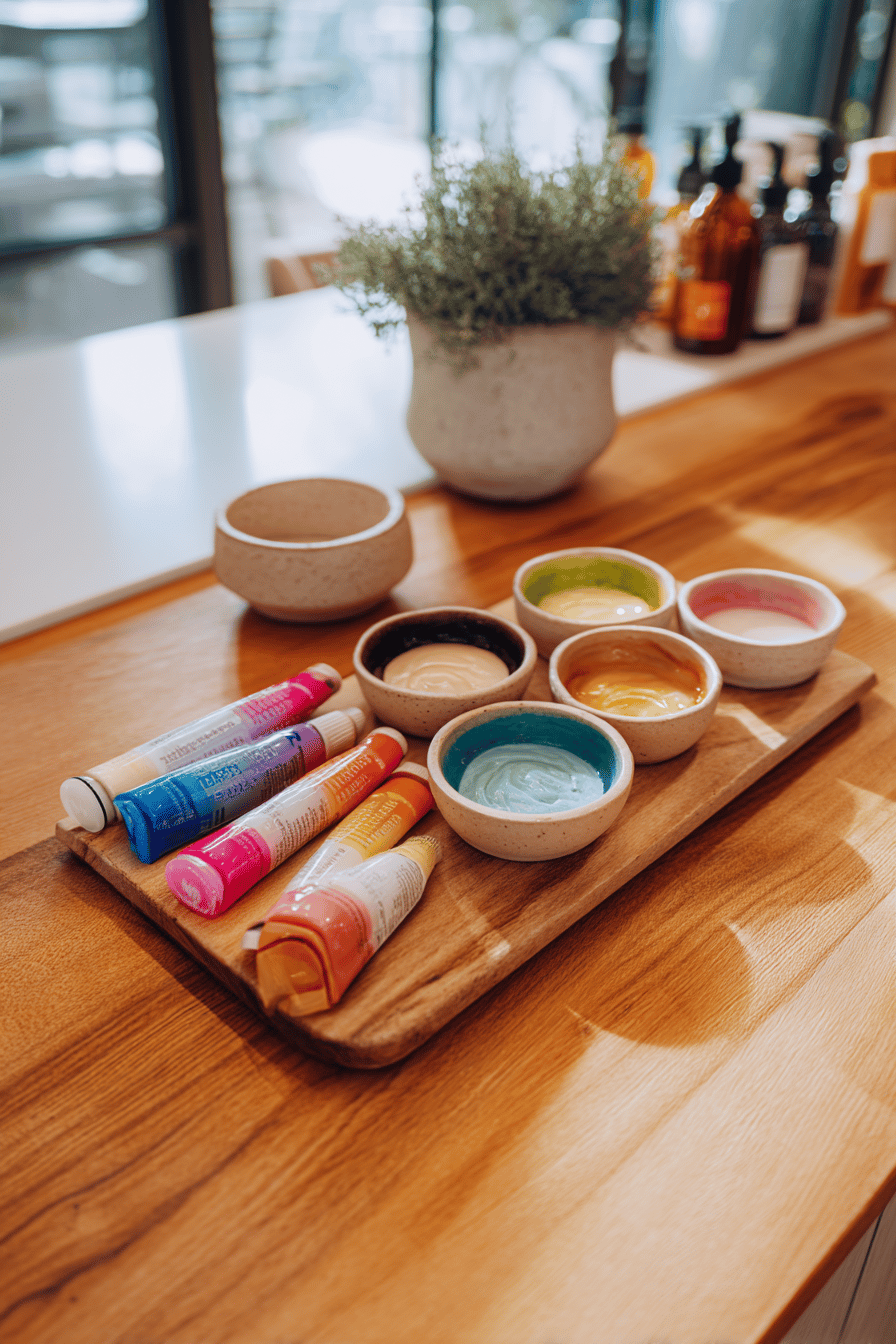
Dietary Substitutions to Customize Your meringue cookies
Meringue cookies can be customized to accommodate dietary needs and preferences. Vegans can substitute the egg whites with aquafaba, which whips similarly and creates a fluffy texture. For sugar-free or lower-calorie variations, use erythritol or stevia instead of granulated sugar, adjusting quantities to maintain sweetness and stability. Due to their natural gluten-free composition, meringues meet gluten intolerance requirements, though it’s important to ensure flavorings and decorations are also gluten-free.
For added variety, experiment with different natural flavor extracts such as almond, lemon, or coconut to create personalized tastes. These substitutions maintain the essential qualities of meringue cookies light, crisp, and flavorful while accommodating diverse dietary restrictions and preferences.
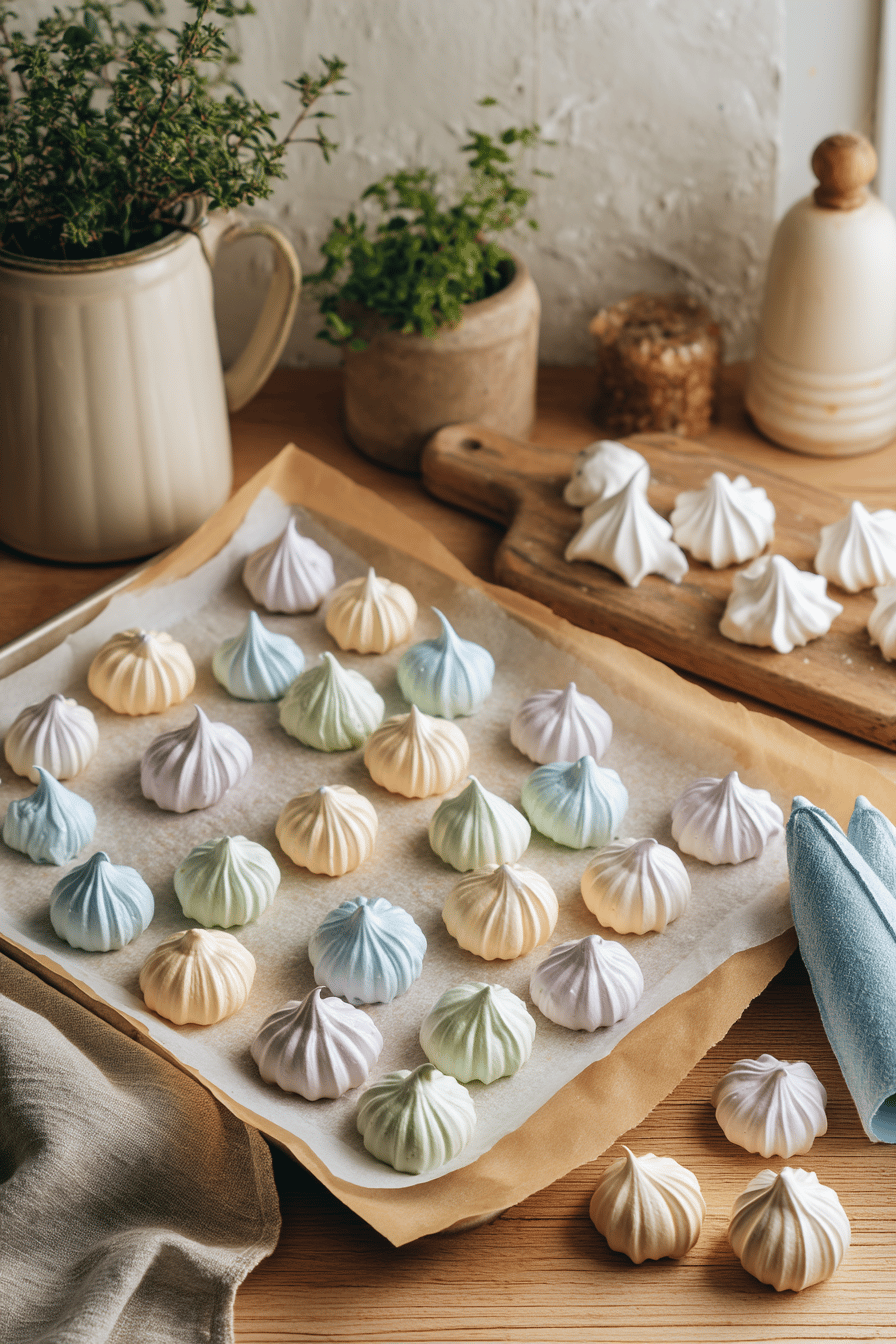
How to Prepare the Perfect meringue cookies: Step-by-Step Guide
- Preheat the oven: Set to 225°F (105°C) and line baking sheets with parchment paper.
- Prepare equipment: Ensure all utensils and bowls are clean, dry, and grease-free to support proper egg white whipping.
- Separate egg whites: Carefully separate 4 large egg whites into a clean bowl, avoiding yolk contamination.
- Start whipping: Combine egg whites, cream of tartar, and salt, and whisk on low speed until foamy.
- Add sugar gradually: Increase mixer speed to high and add 1 cup granulated sugar a tablespoon at a time, waiting 15-20 seconds between additions for full dissolution. Continue beating until stiff, glossy peaks form and no sugar granules remain.
- Add flavor and color: Gently fold in vanilla extract and any gel food coloring if desired.
- Shape cookies: Transfer meringue to a piping bag fitted with a large star tip or snip the edge for simple “kiss” shapes. Pipe meringues onto the baking sheets, spacing them about 1 inch apart.
- Bake: Bake at 225°F (105°C) for 1 hour.
- Dry and cool: Turn off the oven and leave the meringues inside for 1 to 2 hours with the door closed to dry completely.
- Store properly: Once cooled, store in an airtight container at room temperature away from moisture.
This method yields light, crisp meringue cookies with a melt-in-your-mouth texture, suitable for various dietary preferences and occasions.
Advanced Tips and Variations
For best results, use room-temperature egg whites from fresh or slightly aged eggs, which whip up more effectively. Avoid any grease or moisture in your mixing bowl and beaters, as these prevent proper aeration. Add cream of tartar to stabilize the meringue and achieve maximum volume and texture.
Flavor-wise, experiment with extracts such as almond, peppermint, lemon, orange, coconut, cherry, or raspberry to customize your cookies. For visual appeal, incorporate gel food coloring sparingly or paint the inside of the piping bag for creative patterns. When piping, work promptly to maintain volume and shape.
For a delightful twist, dip cooled meringues in melted chocolate or sprinkle crushed nuts or peppermint on top. To improve texture, consider mixing in a small amount of cornstarch with the sugar for a softer interior. If meringues soften after baking or during storage, return them to the oven at 225°F (105°C) for 10-20 minutes to crisp up, watching closely to avoid browning.
Mastering these tips and experimenting with variations will enable you to create stunning, delicious meringue cookies that suit any occasion and dietary preference.
For further detailed techniques on perfecting meringue cookies, visit How to Make Perfect Meringue Cookies and Tips for Whipping Egg Whites Properly.
How to Store meringue cookies: Best Practices
Proper storage is key to preserving the crisp texture and delicate flavor of meringue cookies. Store them in an airtight container at room temperature, keeping them away from heat and moisture, which can cause softening and stickiness. Avoid refrigerating meringues since the humidity in the fridge can make them chewy and ruin their characteristic crunch. For longer term storage, freezing is an option. Place the cookies in a sealed container or freezer bag and freeze for up to three months. When you want to enjoy them, allow the meringues to thaw at room temperature while still in the container. This helps prevent condensation, which could make the cookies soggy. Following these best practices will help your meringue cookies remain light, airy, and crisp for up to two weeks, making them an ideal make-ahead treat.
Nutritional Value of meringue cookies
| Nutrient | Amount per meringue cookie (approx.) |
|---|---|
| Calories | 18–21 kcal |
| Carbohydrates | 4–5 g |
| Protein | 1 g |
| Fat | Less than 1 g |
| Sodium | 5–12 mg |
| Potassium | 7–11 mg |
| Sugar | 4–5 g |
Meringue cookies are a low-fat and low-calorie treat primarily composed of whipped egg whites and sugar. Protein content comes mainly from egg whites, while sugar provides the majority of carbohydrates. These cookies contain no cholesterol and are naturally gluten-free, making them suitable for many dietary restrictions. Using sugar substitutes can reduce the glycemic load for those monitoring sugar intake or managing diabetes. Overall, meringue cookies serve as a light, guilt-free sweet snack option, especially when adjusted to specific dietary needs.
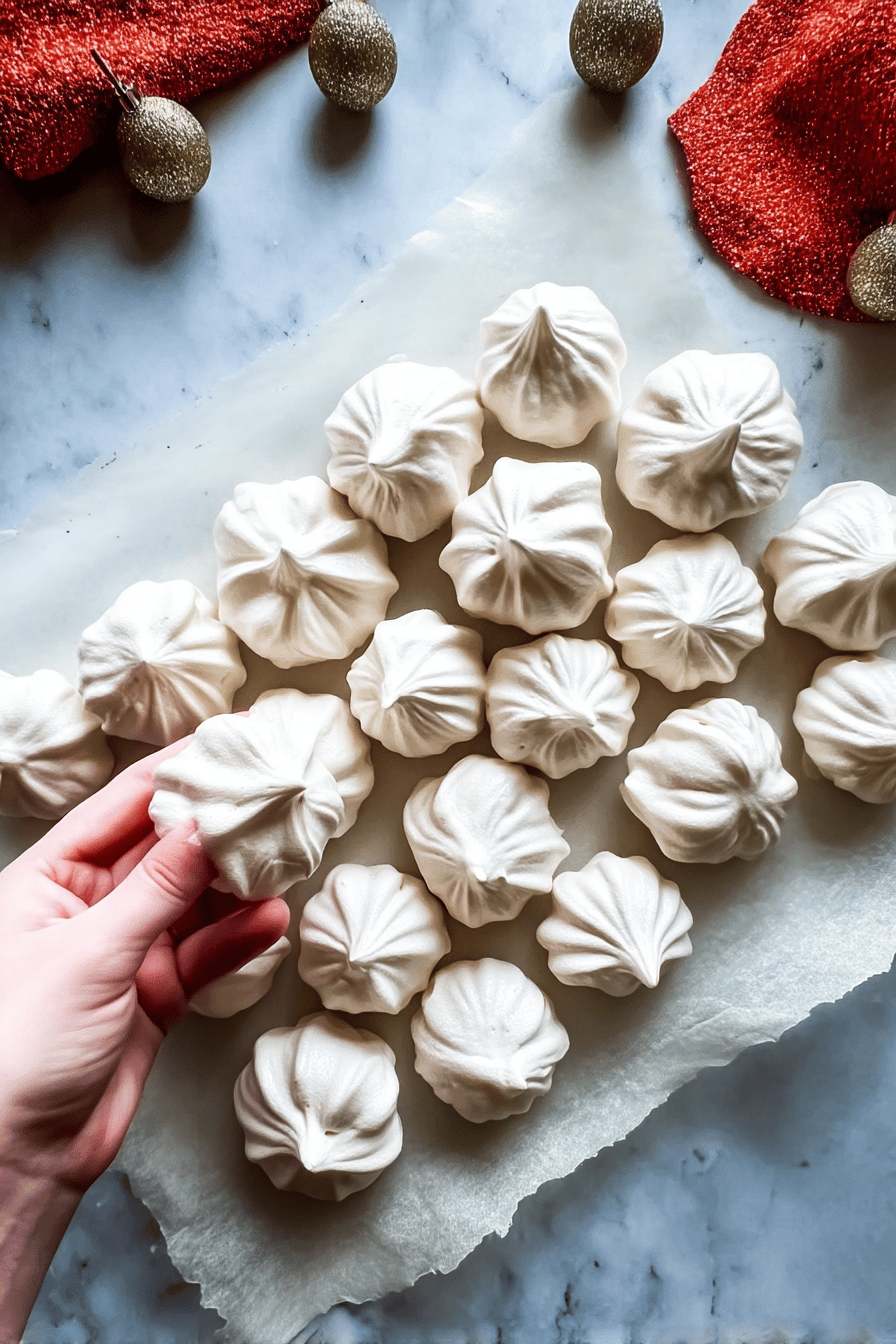
FAQs: Frequently Asked Questions About meringue cookies
How do I know when my meringue has reached stiff peaks?
To identify stiff peaks, lift the beaters from your whipped egg whites. The peak formed should stand straight up without folding or drooping. The mixture will also appear glossy and hold its shape firmly. This stage means the meringue is properly whipped and ready for the next steps like folding in sugar or flavoring.
Why are my meringue cookies turning out chewy instead of crisp?
Chewy meringues often result from underbaking or high humidity. Make sure to bake them at a low temperature for the full recommended time and leave the oven door slightly open or turn off the heat and let the meringues dry inside the oven for at least an hour. Store them in an airtight container away from moisture to maintain crispness.
Can I add colors and flavors to meringue cookies without affecting texture?
Yes, you can add food coloring and extracts after whipping the meringue to stiff peaks. Use gel food coloring for vibrant colors without adding extra liquid. When adding extracts, reduce the main flavor slightly to balance. Avoid adding too much liquid as it can weaken the meringue’s structure.
How should I store meringue cookies to keep them fresh and crisp?
Store meringue cookies in an airtight container at room temperature, in a dry place away from heat and humidity. Properly stored, they can stay fresh and crisp for up to two weeks. Avoid refrigeration, as moisture can make them soft or sticky.
What common mistakes cause meringue cookies to become flat or collapse?
Flat or collapsed meringues are usually due to whipping egg whites that are too cold, adding sugar too quickly, or having grease or yolk mixed in. Always use room temperature egg whites, add sugar gradually while whipping, and ensure all bowls and beaters are clean and free of fat before starting.
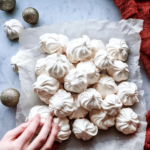
Meringue Cookies Recipe: Light, Crispy, and Easy to Make at Home
- Total Time: 2 hours 20 minutes to 3 hours 20 minutes
- Yield: 48 to 80 cookies 1x
- Diet: Gluten-Free
Description
🍬 These light and crispy meringue cookies offer a delightful sweet treat that melts in your mouth, ideal for any occasion.
💨 Easy to make at home, they bring elegance to your dessert table, perfect for parties or as a sweet snack!
Ingredients
4 large egg whites at room temperature
½ teaspoon cream of tartar
⅛ teaspoon salt
1 cup (200 g) granulated sugar
1 teaspoon vanilla extract (optional)
Optional: gel food coloring for decorative effects
Instructions
1. Preheat oven to 225°F (105°C) and line baking sheets with parchment paper.
2. Ensure mixing bowls and beaters are clean and free from grease.
3. Separate egg whites into a clean bowl, ensuring no yolk contamination.
4. Combine egg whites, cream of tartar, and salt in the bowl and begin mixing at low speed until foamy.
5. Gradually increase mixer speed to high, adding sugar one tablespoon at a time, letting it dissolve between additions.
6. Mix until thick, glossy, and forming stiff peaks. Test for grittiness by rubbing between fingers.
7. Stir in vanilla extract and gel food coloring if using; mix gently.
8. Transfer meringue to a piping bag with a star tip and pipe onto prepared sheets, spacing 1 inch apart.
9. Bake for 1 hour, then turn off oven and let meringues cool and dry inside with door closed for 1-2 hours.
10. Store cookies in an airtight container at room temperature for up to two weeks.
Notes
🥚 Use room-temperature egg whites for better volume and stability.
🍯 Add sugar slowly, dissolving fully before more additions to ensure texture.
🌦️ Make meringues during dry weather to avoid issues with humidity.
- Prep Time: 20 minutes
- Cooling/drying time: 1 to 2 hours
- Cook Time: 1 hour
- Category: Dessert
- Method: Baking
- Cuisine: French
Nutrition
- Serving Size: 1 cookie
- Calories: 20
- Sugar: 5g
- Sodium: 8mg
- Fat: 0g
- Saturated Fat: 0g
- Unsaturated Fat: 0g
- Trans Fat: 0g
- Carbohydrates: 5g
- Fiber: 0g
- Protein: 1g
- Cholesterol: 0mg
Keywords: Meringue, Cookies, Light, Crispy

